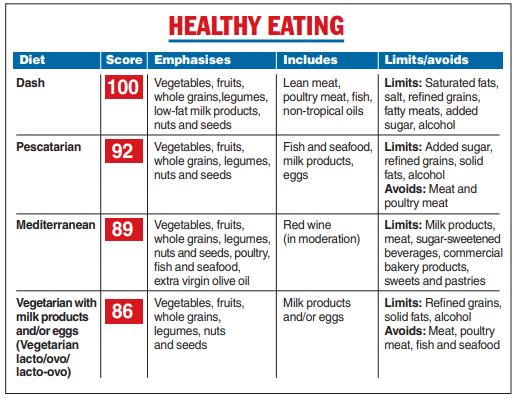Four popular diets that emphasise fruits, vegetables, whole grains, poultry meat and fish are among the best for health, according to the American Heart Association which released a scientific statement on Thursday to try and clear any confusion.
The AHA has assigned the highest score to the so-called Dash (Dietary Approaches to Stop Hypertension) diet that prescribes vegetables, fruits, whole grains, legumes, nuts, seeds and low-fat milk products and includes lean meat, poultry meat, fish and non-tropical oils. (Diet chart below)
The statement has assigned the second-highest score to a pescatarian (someone who eats fish but not meat) diet marked by vegetarian eating patterns along with fish and seafood but no meat. The Mediterranean diet, which is similar to Dash but includes extra virgin olive oil and moderate red wine, and vegetarian diets with milk products and eggs have also received high scores.

“The number of different, popular dietary patterns has proliferated in recent years and misinformation about them on social media has reached critical levels,” Christopher Gardner, chair of the AHA panel that wrote the scientific statement, said in a media release.
The 10-member expert panel published the statement on Thursday in Circulation, the AHA's flagship journal.
The public — and even many healthcare professionals — may rightfully be confused about heart-healthy eating, Gardner said. The scientific statement is intended to help the public and healthcare professionals to understand which diets promote cardiovascular health.
The panel has assigned the lowest scores to the so-called paleo diet — which includes vegetables, fruits, lean meat, fish and eggs but excludes whole and refined grains, legumes, oil and dairy products — and very-low-carbohydrate, ketogenic diets that limit carbohydrate intake to less than 10 per cent of daily calories.
The paleo and ketogenic diets are “highly restrictive” and difficult for most people to stick to for long, Gardner said.
“While there will likely be short-term benefits and substantial weight loss, it is not sustainable. A diet that’s effective at helping maintain weight loss goals needs to be sustainable,” Gardner said.
The statement is the first to analyse how closely different diets adhere to key features of the AHA’s dietary guidance, which emphasises limiting unhealthy fats and excess carbohydrates to optimise cardiovascular health and lower the risk of other health disorders, such as type-2 diabetes.
The panel has assigned Dash the highest score of 100. The pescatarian diet has received the second-highest score of 92, followed by the Mediterranean diet (89) and vegetarian diets with milk products or eggs (86).
These four top-tier dietary patterns best align with the AHA’s guidance for healthy eating and “may be adapted to respect cultural practices, food preferences, and budgets to enable people to always eat this way for the long term”, Gardner said.











